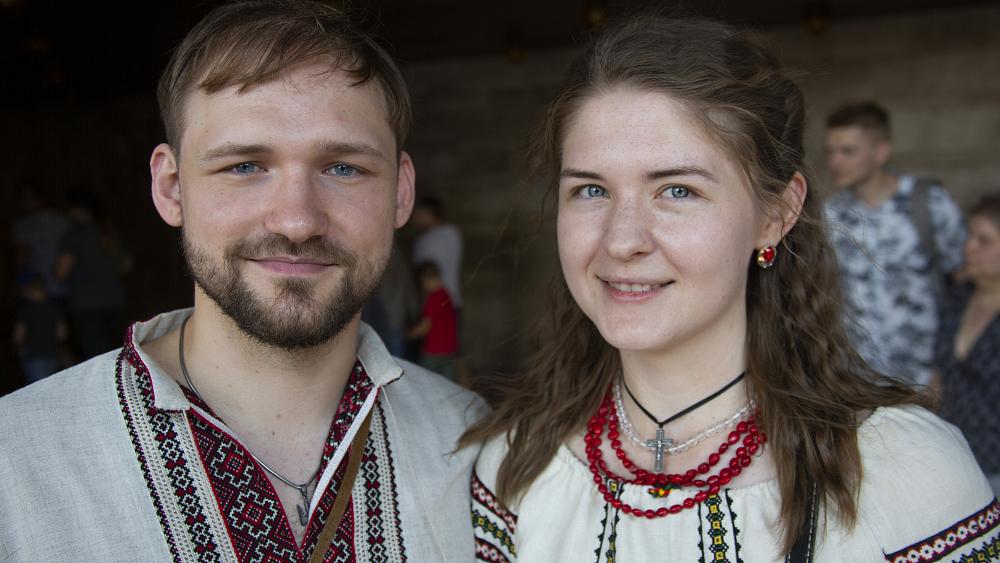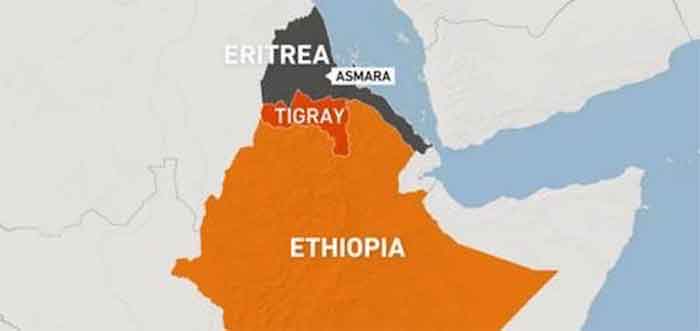
Wearing traditional embroidered shirts, Pavlo Shykin, 27, and Dana Vitkovska, 26, were all smiles on Tuesday as their nation, Ukraine, celebrated 30 years of independence.
Thousands of Ukrainians flocked to Kreshatyk Street, the main vein of the Ukrainian capital, Kyiv, as the country celebrated the landmark date with an impressive parade of soldiers, vehicles, planes and strike drones.
Shykin and Vitkovska are about to change their own independent status by getting married but gave Euronews a sense of how the nation is seen by people born shortly after the independence of 1991.
The soon-to-be-married couple lived through the economic and social turmoil of the 90s when Ukraine was trying to form a new nation out of a former Soviet republic. They were teenagers at the beginning of this millennium, just as Ukraine started to see economic growth, and they were both university students when the ‘Revolution of Dignity’ ousted former president Viktor Yanukovich in 2013-2014.
“There’s been a lot of different times. When we were born, they were very hard times for Ukraine. Our parents tell us that it was a very hard period. But the economic situation improved, we had growth, and the situation became much better. I don’t remember the bad times, only the good ones,” says Shykin, who, as an economist, is very much aware of the peaks and troughs of the nation’s fiscal history. But his girlfriend Dana Vitkovksa sees a more psychological phenomenon at work.
“People didn’t feel like Ukrainians,” she tells Euronews.
“They didn’t have their own identity, but this situation is changing. You can see that people are becoming aware of the fact, that they are one nation. Maybe the war in the East is the reason that they embraced their identity. I think that it is becoming better every year.”
Revolution of Dignity
The 2014 revolution that ousted president Yanukovich has many names. In the west, it is commonly known as Maidan. In Ukraine, it is often called the Revolution of Dignity. It is objectively one of the most defining moments of modern Ukrainian history, but also for Shykin, the revolution has a very special place.
“I remember the Orange Revolution and the Revolution of Dignity. I was a student and I was on the Maidan and saw the fights against the Berkut (the riot police unit that has since been abolished), and we built barricades. For me, it was a real revolution of dignity. After that, I realised that I was Ukrainian and I wanted to be Ukrainian,” says Shykin.
Still, according to the young couple, Ukraine has some way to go in the fight against corruption. But even though the state is struggling to rid itself of such a thing, argues Vitkovska, society is slowly changing.
“It is not that easy to change all the people. We have 40 million people, and they are different. Many of them are old and used to live in conditions where you have to bribe someone or have connections, if you want something. Now I think many people change their mindset, but it is a long process,” says Vitkovska.
There was a dream called Ukraine…
This young couple is in no doubt about the importance of Ukrainian identity, and their need to fight for it, but what is it?
“To be Ukrainian is to love our country and wanting it to prosper,” says Shykin before Vitkova jumps in:
“To love our culture, because I think we have to not let it die. A lot of people forget that our grandmothers used to make a lot by hand, that is a part of our culture. And for example, in Belarus, a lot of the people are speaking Russian instead of Belarusian. It is not for the best. You lose something valuable.”
How does she see the future?
“In 30 years, we will have children,” says Vitkova. “They will be 25 years old, I hope they will learn to be proud of who they are, to live by the law. We will manage to fight corruption, the political situation will change for the better because people who are young now and fighting for Ukraine will be the political elite,” says Vitkova.
Context: A short history of Ukrainian independence
Exactly 30 years ago on Tuesday, the Ukrainian parliament passed a declaration of independence cementing the fact that the USSR had collapsed. Ukraine was now its own state again, and for the first time in years, the country had to find its own way through the world.
Leonid Kravchuk was elected as the first president of Ukraine and served in a time of harsh economic recession. When the second president, Leonid Kuchma, ascended to power, the country began making up for the lost ground with strong economic growth.
In 2004, Kuchma left office. Ukraine was now left with the choice between electing Viktor Yanukovich or Viktor Yuschenko as president. Yanukovich was in favour of stronger ties with Russia, while Yuschenko had his eyes turned to the West.
Yanukovich won the election by a very tight margin, but alleged fraud and intimidation of voters had the supreme court rule the results null and void following massive protests that were later called the Orange Revolution.
Yuschenko won the election in the second run-off and served until 2010, where Yanukovich made a comeback and was elected president. During his time, he was accused of taking Ukrainian democracy down a more authoritarian road.
It all culminated in 2013 when Yanukovich did not sign the Association Agreement with the European Union and instead tried to snuggle up to the Kremlin. Again, protesters went to the streets and formed an enormous sit-in on Maidan Nezalezhnosti – Independence Square.
They were met with police brutality and by the end, around 130 people had died. It would get a lot worse a lot quicker. Yanukovich was forced to resign in February 2014 after three months of protests and in March, Russia annexed the Crimean Peninsula in southern Ukraine.
Every weekday, Uncovering Europe brings you a European story that goes beyond the headlines. Download the Euronews app to get a daily alert for this and other breaking news notifications. It’s available on Apple and Android devices.
Related posts:
Views: 0
 RSS Feed
RSS Feed

















 August 25th, 2021
August 25th, 2021  Awake Goy
Awake Goy 


 Posted in
Posted in  Tags:
Tags: 
















